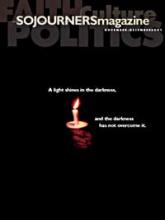A few weeks ago, the Jewish community celebrated the harvest festival by building "sukkot." What is a "sukkah"? Just a fragile hut with a leafy roof, the most vulnerable of houses. Vulnerable in time, where it lasts for only a week each year. Vulnerable in space, where its roof must be not only leafy but leaky-letting in the starlight, and gusts of wind and rain.
Why a sukkah? Why does the Sukkot prayer plead to God for a "sukkah of shalom" rather than God's "tent" or "house" or "palace" of peace? Precisely because the sukkah is so vulnerable.
For much of our lives we try to achieve peace and safety by building with steel and concrete and toughness-pyramids, air raid shelters, Pentagons, and World Trade Centers. We harden what might be targets and, like Pharaoh, harden our hearts against what is foreign to us. But the sukkah comes to remind us: We are in truth all vulnerable. If "a hard rain gonna fall," it will fall on all of us.
Americans have felt invulnerable. The oceans, our wealth, our military power have made up what seemed an invulnerable shield. Yet on Sept. 11 the ancient truth came home: We all live in a sukkah.
The planet is one interwoven web of life. I must love my neighbor as I do myself, because my neighbor and myself are interwoven. If I hate my neighbor, the hatred will recoil upon me.
Read the Full Article
